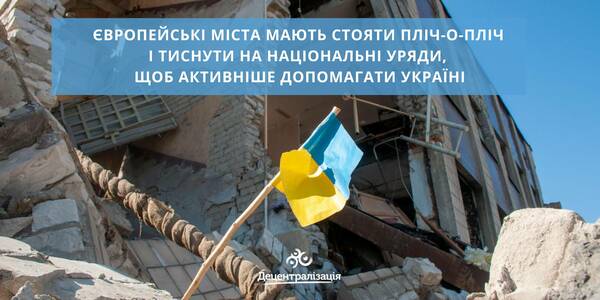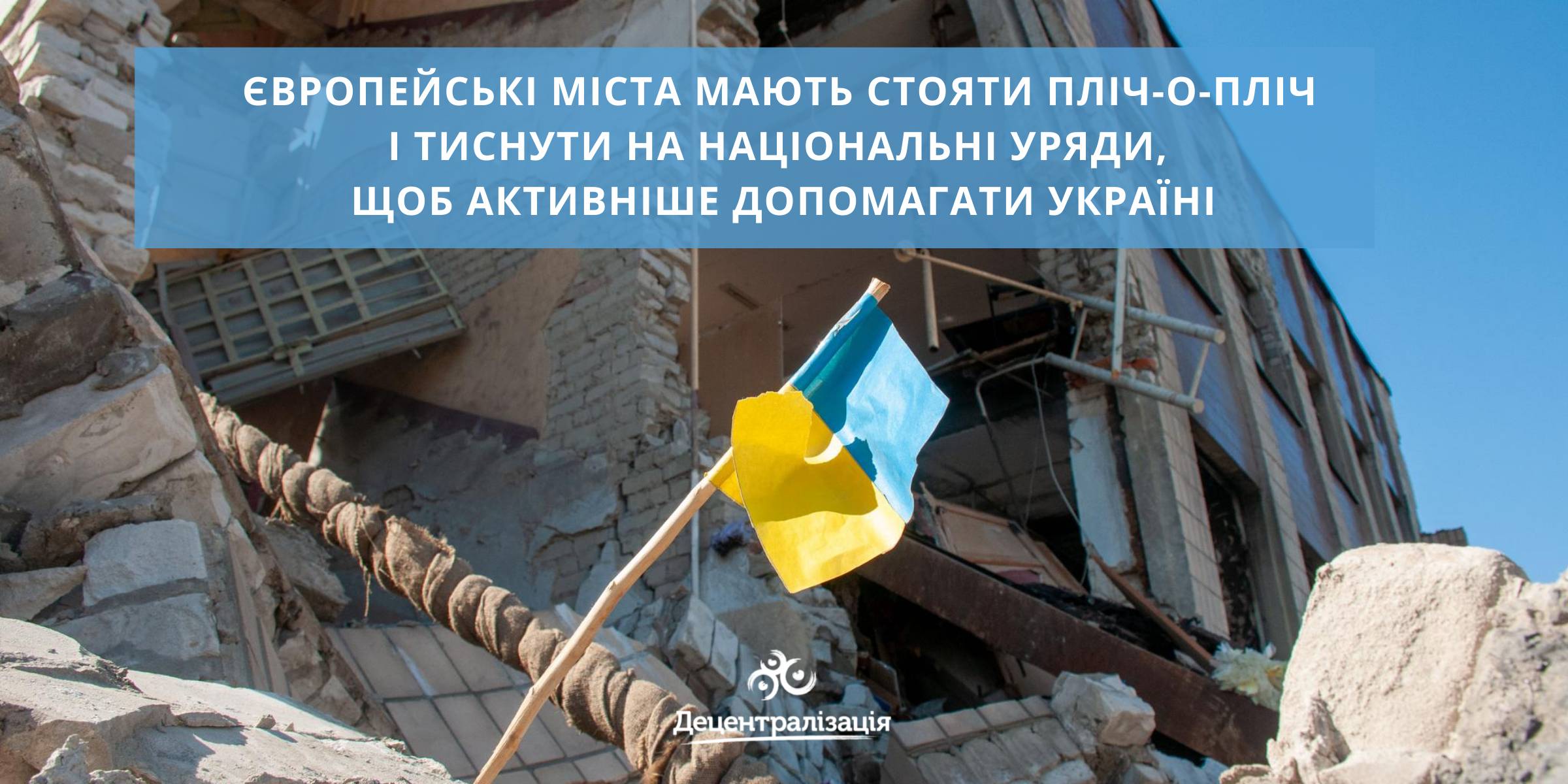“European cities must stand shoulder to shoulder, putting pressure on national governments to help Ukraine more vigorously”: Key messages from the third stage of the International Marathon of Local Governments
“Being concerned is not enough today, one must be resolute! Now is not the time for half-hearted decisions, the time has come for bold and strong decisions!” These were the words of Viacheslav Nehoda, Deputy Minister for Communities and Territories Development of Ukraine, when addressing on 29 March 2022 the participants of the third online meeting of Ukrainian and European mayors held as part of the “Local Governments Unite for Welfare and Peace” International Marathon.
Paraphrasing the words of German Pastor Martin Niemöller, Viacheslav Nehoda warned those politicians who still maintain a wait-and-see attitude: “Some of you were silent when Russia invaded Moldova because you are not Moldovan; you were silent when it invaded Georgia, because you are not Georgians; you were silent when it came to Syria, because you are not Syrians. Some people intend to remain silent even now that Russia has attacked Ukraine. Will there be anyone to stand up for you when Russian Nazism eventually comes to your country?” Serhiy NADAL, Ternopil’s Mayor, added that Putin’s imperial ambitions were “not only to destroy Ukraine, but to seize half the world! That is why Ukraine is now at the forefront of the fight against evil! This historical past must be buried once and for all.”
Claudia Luciani, Director of the Directorate of Human Dignity, Equality and Governance, Council of Europe, emphasised the need to join forces and show solidarity with Ukraine: “Time demands devotion to our Ukrainian friends from all of us, as we keep faith to our values.” Marianne Schuurmans, Chairperson of the Dutch Association of Mayors, agrees: “All Dutch mayors have joined forces to ensure that Ukrainian refugees are accommodated decently. Ukrainian flags are flying all over Holland. We have opened the doors of our schools to Ukrainian children. We are doing our best to make Ukrainians feel at home in Holland.”
Mārtiņš Staķis, Mayor of Riga, Latvia: “We have always been friends of Ukrainians and stand shoulder to shoulder now with residents of Mariupol, Kyiv, Trostianets and other cities of Ukraine. Next to my office is a refugee centre, where women and children come every day bearing their sufferings. Riga will be a safe home for them. It is our sacred duty to provide help to Ukrainians.”
Lars Gravråkk, Political Adviser, the City of Oslo, Norway: “European cities must stand shoulder to shoulder, putting pressure on national governments to help Ukraine more vigorously. We must be together whenever our shared values — freedom, independence, human rights — come under threat.”
Ukrainian mayors have also called for tougher economic sanctions and isolation of Russia. Andriy Sadovyi, Lviv’s Mayor, pointed out that “today, the whole world sees the heroism of Ukraine that shields the entire democratic world. At the same time, we also see the birth of Nazi Russia, we see Putin as the new Hitler. Russians revel in killing civilians and children. Lviv was also heavily shelled, people died here. The missiles hit 20 km from the Polish border. Cooperation with Russian sports and cultural organisations means cooperating with the Nazis. Each bearer of the Russian passport represents the country that kills innocent people. The 200,000 Russians who attacked Ukraine are all actual people. Nazi policy is a terrible thing, which is very hard for our European partners to understand.”
Manifesting solidarity with Ukraine may include revising the relations with the Russian Federation’s sister cities that support the war. Representatives from numerous municipalities have informed they had already severed such ties and encourage their peers to follow suit. Anna-Kaisa Ikonen, Mayor of Tampere, Finland, Lars Gravråkk, Political Adviser, the City of Oslo, Norway, Remigijus Šimašius, Mayor of Vilnius, Lithuania, dwelled on this issue.
The Mayor of Vilnius has also given some examples of specific steps taken to support Ukraine: a large Ukrainian flag was hoisted in the city; a huge inscription reading “Putin, The Hague is waiting for you” was made near the Russian Embassy in Lithuania; the street where the embassy is located has been renamed Heroes of Ukraine; some road signs have been augmented and now read “Minsk (occupied by the Kremlin)”. “These may be small things, but every municipality can do them to show its attitude,” said the Mayor.
The three key matters in which representatives from Ukrainian communities turn to their European counterparts for backing remain the same: support for Ukraine’s defence capacity, including countering air strikes, stronger economic pressure on Russia, and promoting Ukraine’s faster European integration.
The importance of stronger economic instruments to influence Russia was highlighted by Volodymyr Bondarenko, Deputy Mayor of Kyiv and Secretary of the Kyiv City Council: “A single military front is not enough to overcome Russia. An economic front is needed: sanctions, sanctions, and more sanctions to drain the Russian economy completely. This is why pressure must be put on those international companies that continue to operate in Russia (Metro, Auchan, Danone, Leroy Merlin and others).”
Anders Knape, President of the Swedish Association of Local Authorities and Regions (SALAR), said: “My association supports Ukraine in every way and we are doing everything we can to make those Swedish companies that do business in Russia stop it. We support even tougher sanctions against Russia and approve the efforts by the Swedish Government to supply weapons to Ukraine.” Similar to his peers, Mr Knape spoke about helping Ukrainian refugees. In his words, in Sweden, most of them are women and children who were made to seek shelter to protect themselves from the war. In the past month, some Ukrainian babies were even born in Swedish maternity hospitals.
Ordinary people are becoming refugees because Russia is deliberately annihilating residents of Ukrainian cities and villages. Vladyslav Atroshenko, Chernihiv’s Mayor, spoke about this. He refuted the propaganda’s claim that Russia was only shelling military targets: “For three weeks, the Russian army has been firing at our city from all kinds of weapons, conducting devastating air bombardments. The Russian pilot shot down over Chernihiv in the cloudless sky at low altitude obviously saw a residential neighbourhood (rather than a military unit) when dropping six bombs on it. That is why the shelling of Chernihiv is the evidence of the genocide waged against the Ukrainian people. Furthermore, we have a lot of ethnic Belarusians and Russians here, about 60–70 per cent of our citizens speak Russian or a mixed Russian-Ukrainian dialect, and I assure you that there are definitely no ultra-right groups in Chernihiv. Russia is destroying our ancient churches as well, and I would like to note that their parishioners belong to the Moscow Patriarchate. Of the city’s 290,000 pre-war population, only 110,000 remain. We will support our military and never surrender. We will never leave Chernihiv. In this city’s millennial history, not a single prince has ever fled in the face of the enemy.”
Oleksandr Korinnyi, Chairman of the Association of Amalgamated Communities, Novoukrainka’s Mayor, spoke about the role of local self-government in opposing this war: “Whenever I heard that our (decentralisation) reform was referred to as one of the most successful in Europe, I was proud of my peers, because it testified to the fact that we were doing something good together by building a truly European Ukraine. Today, I am just as proud of my peers who, together with the Armed Forces, keep their defences high and stand up for their communities. The fact that the invaders ‘hunt’ for community leaders, kidnap and torture them, is an acknowledgement that we are indeed a force to be reckoned with.” Along with other Ukrainian mayors, he called on his European counterparts to become such a force now by exerting influence on the decision-making of their governments and international institutions.
While this dialogue was taking place, air raid sirens were heard in Ukrainian cities and air strikes continued. Vitaliy Klychko, Kyiv’s Mayor, who is currently in the capital, which the Russians have been trying to capture since day one, was unable to join. Yuriy Bova, Mayor of Trostianets, Sumy Oblast, a town situated 30 km from the Russian border and liberated only a few days ago after a month of occupation and complete destruction by the Russian orcs, also found himself in a force majeure situation.
Among other European countries, representatives from municipalities of Belgium, Denmark, Estonia, Finland, Iceland, Latvia, Lithuania, Luxembourg, The Netherlands, Norway, and Sweden joined the Marathon.
The dialogue also covered expanded cooperation between European cities and their Ukrainian partners. Promoting cooperation between Ukrainian and European municipalities is among the goals pursued by the organisers of the International Marathon — the Ministry for Communities and Territories Development of Ukraine, the Council of Europe Programme “Enhancing Decentralisation and Public Administration Reform in Ukraine”, the USAID Economic Resilience Activity, the Swiss-Ukrainian Decentralisation for Improved Democratic Education (DECIDE) project, the Association of Ukrainian Cities, the Association of Amalgamated Communities, the Decentralisation Portal. The friendship that has been tested in such difficult times would form the basis for strategic partnership in the future, when the time comes to rebuild Ukrainian cities and villages. To contact Ukrainian communities or find new partners, please send a message to uamunicipalities@gmail.com.
The Marathon will resume as early as this Thursday, 31 March. The next meeting will be attended by representatives of the municipalities from Southern Europe and Turkey.
A video stream of the event is available at https://fb.watch/c2HuAK8Kvh/
For more information please contact popiukrd@minregion.gov.ua
Official Telegram channel (English version) covering the war is available at https://t.me/UA_struggle
Photo gallery is accessible at https://decentralization.ua/news/tag/foto-viiny

Tags:
international support war marafon yednannia
Source:
Пресцентр ініціативи "Децентралізація"

22 November 2024
Division of competences between the state and...
18 листопада у Бучі відбувся круглий стіл щодо розподілу повноважень органів місцевого самоврядування та органів...
21 November 2024
Громади Хмельниччини долучилися до обговорення реформи старшої школи
Громади Хмельниччини долучилися до обговорення...
15 листопада в Хмельницькому відбулося громадське обговорення впровадження реформи профільної середньої освіти. Захід...
21 November 2024
Програма Polaris провела інформаційну сесію для громад Житомирщини
Програма Polaris провела інформаційну сесію для...
20 листопада у Житомирі відбулася інформаційна сесія Програми Polaris «Підтримка багаторівневого врядування в...
21 November 2024
Стратегія безбар’єрності: експерт розповів про цифрову доступність
Стратегія безбар’єрності: експерт розповів про...
Цифрова безбарʼєрність – один із шести ключових напрямків розвитку, визначених у Національній стратегії зі створення...